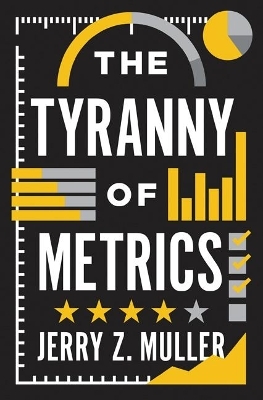
The Tyranny of Metrics
Princeton University Press (Verlag)
978-0-691-17495-2 (ISBN)
How the obsession with quantifying human performance threatens our schools, medical care, businesses, and government
Today, organizations of all kinds are ruled by the belief that the path to success is quantifying human performance, publicizing the results, and dividing up the rewards based on the numbers. But in our zeal to instill the evaluation process with scientific rigor, we've gone from measuring performance to fixating on measuring itself. The result is a tyranny of metrics that threatens the quality of our lives and most important institutions. In this timely and powerful book, Jerry Muller uncovers the damage our obsession with metrics is causing—and shows how we can begin to fix the problem.
Filled with examples from education, medicine, business and finance, government, the police and military, and philanthropy and foreign aid, this brief and accessible book explains why the seemingly irresistible pressure to quantify performance distorts and distracts, whether by encouraging "gaming the stats" or "teaching to the test." That's because what can and does get measured is not always worth measuring, may not be what we really want to know, and may draw effort away from the things we care about. Along the way, we learn why paying for measured performance doesn't work, why surgical scorecards may increase deaths, and much more. But metrics can be good when used as a complement to—rather than a replacement for—judgment based on personal experience, and Muller also gives examples of when metrics have been beneficial.
Complete with a checklist of when and how to use metrics, The Tyranny of Metrics is an essential corrective to a rarely questioned trend that increasingly affects us all.
Jerry Z. Muller is the author of many books, including The Mind and the Market: Capitalism in Modern European Thought (Knopf), Adam Smith in His Time and Ours (Princeton), and Capitalism and the Jews (Princeton). His writing has appeared in the New York Times, the Wall Street Journal, the Times Literary Supplement, and Foreign Affairs, among other publications. He is professor of history at the Catholic University of America in Washington, D.C., and lives in Silver Spring, Maryland.
Introduction 1
I THE ARGUMENT
1 The Argument in a Nutshell 17
2 Recurring Flaws 23
II THE BACKGROUND
3 The Origins of Measuring and Paying for Performance 29
4 Why Metrics Became So Popular 39
5 Principals, Agents, and Motivation 49
6 Philosophical Critiques 59
III THE MISMEASURE OF ALL THINGS? Case Studies
7 Colleges and Universities 67
8 Schools 89
9 Medicine 103
10 Policing 125
11 The Military 131
12 Business and Finance 137
13 Philanthropy and Foreign Aid 153
EXCURSUS
14 When Transparency Is the Enemy of Performance: Politics, Diplomacy, Intelligence, and Marriage 159
IV CONCLUSIONS
15 Unintended but Predictable Negative Consequences 169
16 When and How to Use Metrics: A Checklist 175
Acknowledgments 185
Notes 189
Index 213
| Erscheinungsdatum | 29.01.2018 |
|---|---|
| Verlagsort | New Jersey |
| Sprache | englisch |
| Maße | 140 x 216 mm |
| Gewicht | 765 g |
| Themenwelt | Wirtschaft ► Betriebswirtschaft / Management ► Unternehmensführung / Management |
| Wirtschaft ► Volkswirtschaftslehre ► Ökonometrie | |
| ISBN-10 | 0-691-17495-4 / 0691174954 |
| ISBN-13 | 978-0-691-17495-2 / 9780691174952 |
| Zustand | Neuware |
| Haben Sie eine Frage zum Produkt? |
aus dem Bereich


